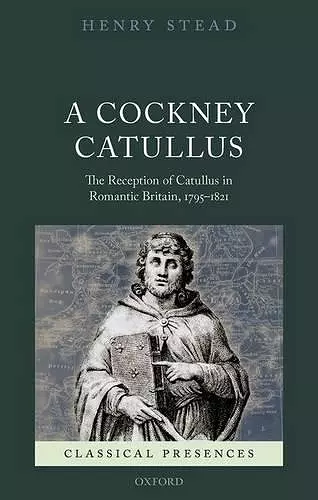A Cockney Catullus
The Reception of Catullus in Romantic Britain, 1795-1821
Format:Hardback
Publisher:Oxford University Press
Published:5th Nov '15
Currently unavailable, and unfortunately no date known when it will be back

Catullus, one of the most Hellenizing, scandalous, and emotionally expressive of the Roman poets, burst onto the British cultural scene during the Romantic era. It was not until this socially, politically, and culturally explosive epoch, with its mania for all things Greek, that Catullus' work was first fully translated into English and played a key role in the countercultural and commercially driven classicism of the time. Previously marginalized on the traditional eighteenth-century curriculum as a charming but debauched minor love poet, Catullus was discovered as a major poetic voice in the late Georgian era by reformist emulators-especially in the so-called Cockney School-and won widespread respect. In this volume, Henry Stead pioneers a new way of understanding the key role Catullus played in shaping Romanticism by examining major literary engagements with Catullus, from John Nott of Bristol's pioneering book-length bilingual edition (1795), to George Lamb's polished verse translation (1821). He identifies the influence of Catullus' poetry in the work of numerous Romantic-era literary and political figures, including Byron, Keats, Wordsworth, Coleridge, Hunt, Canning, Brougham, and Gifford, demonstrating the degree of its cultural penetration.
[This is] a valuable contribution to the field, for its combination of robust historical research and nuanced close readings offers an important revaluation of Catullan influence in the Romantic period. Stead's own close engagement with Catullus' Latin texts in relation to their Romantic translations and allusions provides thought-provoking readings of the Romantics, reminding us what can be learned by considering the choices poets make in adapting other work. * Alexandra Paterson, Romanticism *
For many readers of Romantic poetry and their classical colleagues, this detailed study will provide an opportunity to reconsider in unfamiliar contexts a variety of Romantic poems and translations, and also to explore the largely unexpected emergence of Catullus in England during that period. * Timothy Webb, The Keats-Shelley Review *
a rich and diverse collection of responses to Catullus from an important and clearly defined period in British literary history ... A Cockney Catullus is an important and impressive achievement. * Timothy Saunders, Translation and Literature *
[Henry Stead] has assembled a fascinating history of the diverse receptions of Catullus in an age of polarised politics and high anxiety because of events on the continent ... Stead is a perceptive guide to these turbulent times. His style is not encumbered by a reliance on jargon, but manages to be both academic and accessible. * Alan Beale, Classics for All *
With sensitive critical alertness and in an engaging post-ironic style warmed with a generous measure of the 'cheer' and sociality he imputes to the best Cockney readers he studies, Stead tells an important story about how Catullus came to look the way he looks now. It is a story that will interest classicists, comparatists, and translation theorists as well as literary historians. * David Wray, The BARS Review *
Stead is a commendably unsqueamish guide ... I look forward to future work on Romanticism and Latinity from Stead because his fine, detailed knowledge of the classical canon should enable him to provide scholars of the period with insights available to few others. * Andrew Elfenbein, Modern Philology *
lively and illuminating ... Although naturally of interest to students of Catullus, of his receptions in British literature and of Romanticism, this monograph will richly reward students of Latin poetry and classical receptions more generally. * Benjamin Eldon Stevens, Classical Review *
ISBN: 9780198744887
Dimensions: 222mm x 154mm x 26mm
Weight: 578g
368 pages